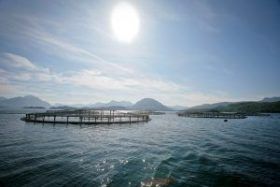
- New satellite communications technology looks set to revolutionise Scotland’s aquaculture sector
A group of partners, including CENSIS, has received a £250,000 funding package to revolutionise the collection, interpretation, and use of data on fish farms, with the development of a new digital platform that will enable actionable insights.
Led by satellite communications start-up R3-IoT, the partners will develop a software system that automatically captures large volumes of continuous sensor data across aquaculture sites securely in one place, where it can be processed, stored, and actioned. The digital platform will be developed in parallel with R3-IoT’s satellite communications solution, which brings seamless connectivity to remote and rural areas – enabling organisations to fully digitise their business operations across multiple sites and locations.
Funded by the Seafood Innovation Fund, the partners comprise CENSIS alongside the Sustainable Aquaculture Innovation Centre; Northern Light; The Data Lab, Edinburgh Napier University; University of Stirling’s Institute of Aquaculture; and the Scottish Salmon Producers Organisation.
Covid-19 has accelerated a number of trends across the aquaculture sector, primarily the need for timely access to information – from environmental metrics like oxygen, temperature, and salinity, to operational datapoints such as wave height and strength. R3-IoT’s platform will automate the collection of data from a range of sensing technologies already in place, allowing fish farms to use this information to remotely manage their operations more efficiently.
Once developed, the new digital platform will enable organisations to regularly share environmental and operational data with regulators, supply chain companies, researchers and other stakeholders to enhance efficiency and transparency, while reducing risks and associated costs. The technology developed could be equally beneficial to forestry, agriculture, and other sectors with a remote or rural aspect.
Allan Cannon, CEO and co-founder of R3-IoT, said: “Aquaculture has ambitious plans to deliver sustainable growth and data can be a key enabler for the sector. But having data is only the first step – you also have to unlock its potential, which is what the digital platform we are developing through this project will deliver. The technology will help fish farmers understand operations across different sites and locations wherever they are, providing them with increased visibility, improved quality of, and access to timely information. It will also allow them to remotely and quickly respond to data-driven insights to improve business performance.
“The concept behind our data platform has been informed by the research we conducted as part of the initial feasibility study, interviewing more than 30 senior members of the fish farming sector – it will closely reflect what the sector has told us it needs. We have a great consortium working on this project, taking in a range of expertise and skills, and – having demonstrated the high reliability of the platform during a trial with a major salmon producer – we believe the results could be very high-impact.”
The project builds on an initial Seafood Innovation Fund feasibility study conducted by R3-IoT to gauge the level of connectivity and digitisation in the aquaculture sector. It found very few of Scotland’s 169 active seawater finfish sites are digitally enhanced or fitted with any smart sensors feeding live data back to producers.
In the same survey, fish farmers highlighted several obstacles to the adoption of new digital technologies. The single most significant challenge was around the availability and quality of connectivity.
Heather Jones, CEO at Sustainable Aquaculture Innovation Centre, added: “This digital tool could bring another level of intelligence to aquaculture, allowing site teams to understand conditions on site even if they are working remotely. Using sensor data they could, for instance, identify issues with a particular area of the farm being affected by tidal influx with increased levels of plankton and chlorophyll.
“Fish farmers will be able to decide the metrics and parameters that matter to them. When industry professionals see this in action, they may want to take it further and could even explore concepts such as preventative maintenance type models. Rather than sending an engineer to inspect a machine every month or so, they will be able to plan inspections when they are required, saving time and resource.
“Ultimately, it could be a powerful tool for fish farmers, helping them to enhance fish health and wellbeing, work with stakeholders, and potentially improve transparency – all of which can contribute to the sector’s sustainable growth.”
Bill Buchanan, Professor at Edinburgh Napier University, commented: “We need to build systems of the future which are data-driven and which support new ways to providing intelligence for our traditional industries. One of the major challenges relates to gathering data from remote locations, but R3-IoT overcome these physical barriers and open up a world of interconnected devices. The usage of satellite communications thus overcomes many of the problems we have in connecting to remote regions, and should support a range of existing industries and support new business models.
“A core part of this project is not just to collect, interpret and use fish farm data, but also to understand the security risks involved in data gathering, processing, analysis and storage. We are thus proud to collaborate on this project, and aim to make sure the system is secure, trustworthy and resilient, by design and in its implementation. Overall, it is great to see an innovative Scottish company supporting our traditional industries and economic activity for key communities, but also in building towards the future.”